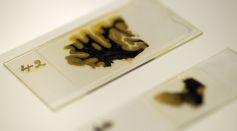MEDICINE & HEALTH

Could Chewing Gum Reduce the Spread of COVID-19? Probably, Experts Say

HIV is Now a Treatable, Preventable Disease; Medical Breakthrough Worth Celebrating this World Aids Day

Can Neuralink Chip Be Removed? Experts Say You Might Want to Think Through It Before Doing That

Microplastic Contamination: Researchers Show How Steam Disinfection of Rubber Nipples in Feeding Bottles Affect Babies, Environment

Silver Bullet for Cancer Metastasis Found by Princeton Researchers: Disables Gene in Human and Mice Tissue

COVID-19 Antibody Levels: New Study Reveals Strength Depends on Age, Gender; Results Found After 2nd Pfizer Inoculation

Weight Training: Why It’s Vital for Older Adults to Include Weightlifting in Their Exercise Routine

COVID-19 Omicron Variant: WHO Shares Tips on How to Protect Yourself From Being Infected

Is Football Bad for Your Brain? MRI Scans Reveal Lesions on White Matter Linked to Years of Repetitive Head Injuries from Playing

Omicron COVID-19 Variant: Fiji Health Ministry Warns Mutant Form Increases Risk of Reinfection
54-Year-Old Vegan Man Begged For Vaccine Before He Died After Rejecting It When He Learned It Underwent Animal Testing

Breakthrough Study on a Living Slice of Brain Will Help Develop New Drugs, Treatments for Fatal Diseases

COVID-19 New Wave Coming? Fauci Says Virus is Not Going Away, Eradication Impossible

Eye Sight Problems? Recent Study Shows How It Can Be Improved Using Deep Red Light
Most Popular

NASA Reveals an Astronaut Was Medically Evacuated From the ISS for the First Time After a Non-Emergency Health Scare

How the Immune System Fights Diseases: Antibodies, Vaccines & Lasting Protection

Sun Reaches Solar Maximum: What the Intensifying 11-Year Solar Cycle Means for Earth

Why Biodiversity Matters More Than We Think: How Species, Ecosystems, and Conservation Shape Our Planet





